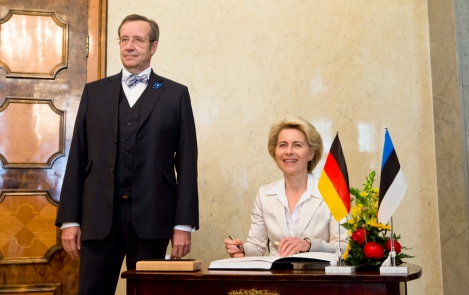-
Reset
+


Estonian head of state to the German Minister of Defence: permanent deterrence units in NATO border states are required in the current security situation
14.04.2015
President Toomas Hendrik Ilves discussed Europe's security situation with the German Minister of Defence Ursula von der Leyen and how NATO as an alliance of collective defence should constitute deterrence with a permanent presence in the Baltic States.
Although there is increasingly talk of a hybrid war, as can be seen in Russia's actions in Ukraine, traditional deterrence, which has been one of the foundations of NATO's credibility for several decades, is still important, the Estonian Head of State said.
He stressed that even though NATO's collective military power clearly exceeds that of Russia, the number of armed units in the Baltic Sea area is now clearly in Russia's favour, which is why it is important for the allies to increase their presence in this region.
According to President Ilves, the formulation of the 1997 Founding Act of NATO and Russia, according to which NATO reiterates that in the current and foreseeable security environment the Alliance will not station additional permanent and substantial combat forces in member states, should be looked at in the context of its time. In the current security situation of 2015, a 1997 Act cannot be an obstacle for the stationing of permanent deterrence units in NATO member states.
"Russia's own actions in Ukraine since early last year have stripped the NATO-Russia Founding Act of its former meaning," the Estonian Head of State said.
At the meeting with the German Minister of Defence, the decision-making processes of Russian armed forces and the speed of deploying units were discussed.
"In the past year, we have noted on several occasions that it takes about four hours from the Russian strategic leadership making a decision to carry out a flash exercise to troops beginning to move on a tactical level," President Ilves described. "This, of course, does not mean the invasion of a NATO ally, but it demonstrates that the speed of decision-making and actual movements today has become a question of mere hours, and does not require the amassing of troops on a border for a lengthy period of time."
The Estonian head of state and the German Minister of Defence also discussed the importance of strategic communication in standing up for our values and the idea of creating a European Union army, noting that even though the Lisbon Treaty foresees a possibility to move in that direction, the goal is still a long way away.
Office of the President
Public Relations Department




